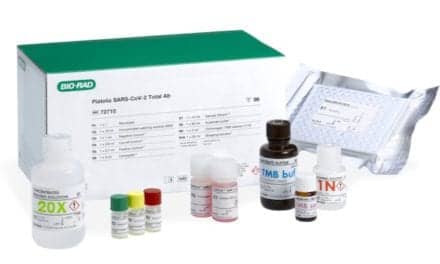AXIM Biotechnologies, an international healthcare diagnostic solutions development company, successfully developed a rapid, point-of-care, non-invasive diagnostic assay for the detection of abnormal alpha-synuclein, a known biomarker for Parkinson’s disease (PD). AXIM’s assay uses a tiny teardrop versus a spinal tap to collect the fluid sample and the test can be run at a doctor’s office with quantitative results delivered from a reader in less than 10 minutes.
A new study released in April of 2023 by the Michael J. Fox Foundation shows that the presence of abnormal alpha-synuclein was detected in an astonishing 93% of people with Parkinson’s who participated in the study.
Furthermore, emerging evidence shows that α-synuclein assays have the potential to differentiate people with Parkinson’s disease from healthy controls, enabling the potential for early identification of at-risk groups. These findings suggest a crucial role for α-synuclein in therapeutic development, both in identifying pathologically defined subgroups of people with Parkinson’s disease and establishing biomarker-defined at-risk cohorts.
Additional studies have already proven that α-synuclein in its aggregated form can be detected in tears; however, these previous studies collected tears using an outdated Schirmer Strip collection method, immediately freezing the samples at 80 below Celsius. The samples were then sent to a lab where a subsequent centrifugation occurs for 30 min. Total tear protein content is first quantified using a bicinchoninic acid assay followed by alpha-Synuclein using a bulky plate reader. This outdated process is neither fast, easy, nor inexpensive. (Sources 1.1, 1.2)
Further reading: Smart Contact Lenses for Cancer Diagnostics & Screening Developed
The nature of AXIM’s new test is that it is non-invasive, inexpensive and can be performed at a point-of-care. It does not require a lumbar puncture, freezing, or sending samples to a lab. Additionally, studies have shown that total lactoferrin content is reduced in patients with Parkinson’s disease. AXIM is already marketing a lactoferrin assay, which may be used in conjunction with the newly developed novel Synuclein test.
“Our proven expertise in developing tear-based diagnostic tests has led to the development of this test in record speed and I’m extremely proud of our scientific team for their ability to expand our science to focus on such an important focus area as Parkinson’s,” says John Huemoeller II, CEO of AXIM Biotechnologies. “With this new assay, AXIM has immediately become a stakeholder in the Parkinson’s Disease community and through this breakthrough, we are making possible new paradigms for better clinical care, including earlier screening and diagnosis, targeted treatments, and faster, cheaper drug development. This is just the beginning for AXIM in this arena, but I am convinced when pharmaceutical companies, foundations and neurologists see how our solution can better help diagnose Parkinson’s Disease in such an expedited and affordable way, we will be at the forefront of PD research, enabling both researchers and clinicians a brand-new tool in the fight against PD.”
According to The Parkinson’s Foundation, nearly one million people in the U.S. are living with Parkinson’s disease. This number is expected to rise to 1.2 million by 2030. Parkinson’s is the second-most common neurodegenerative disease after Alzheimer’s disease. Nearly 90,000 people in the U.S. are diagnosed with PD each year. More than 10 million people worldwide are living with PD. There are currently 219 PD trials going at various Phase I, II and III stages, according to Global Data’s Clinical Trial Database supported by a variety of organizations, from institutions to pharmaceutical companies.





How are the tears collected?